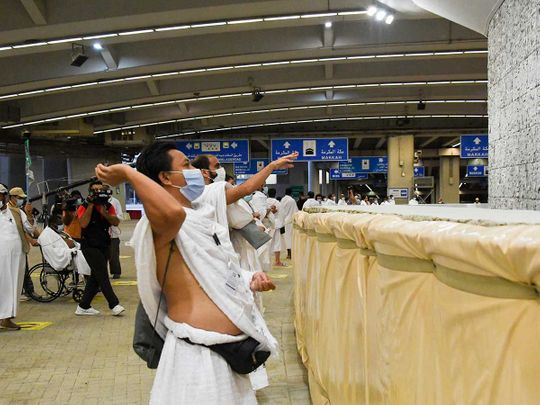
Cairo: Muslims pilgrims Friday began a devil-stoning rite in Saudi Arabia as the Haj is getting under way amid stringent health measures to prevent the spread of the new coronavirus.
The pilgrims stood in groups, observing social distancing as they waited to throw the stones inside a building in the valley of Mina near Mecca. They chanted Allah Akbar (God is the greatest) as they cast the pebbles on the first of the three-day symbolic ritual.
After the stoning, male pilgrims usually change their Ihram garments made of white terry cloth and shave their heads while female pilgrims cut a lock of their hair. Afterwards, they head to Mecca to circumambulate the Kaaba in the Grand Holy Mosque before returning to Mina.
The limited number of the pilgrims, selected for this year’s Haj, has been performing the rituals safely and smoothly while abiding by health precautions, the Saudi news agency SPA said Friday.
Last month, Saudi Arabia announced holding this year’s Haj with a very limited number, confined to Saudis and non-Saudis of all nationalities who are already residing in the kingdom due to the coronavirus.
On Friday, Saudi King Salman Bin Abdulaziz said that Saudi agencies have made “doubled efforts” in organising this year’s downsized Haj.
“I pray to Allah Almighty on this blessed day to allow Muslims to perform the Haj in the next years while we feel sure of their safety and to enable the pilgrims to the House of Allah to complete their rituals on these designated days comfortably, easily and safely,” he added in a televised statement read out on his behalf by acting Media Minister Majid bin Abdullah Al-Qasabi.
Saudi Arabia has announced that 70 per cent of this year’s pilgrims are expatriate residents while the remaining 30 per cent are Saudis. The expatriates wishing to perform this year’s Haj had to meet certain health conditions.
The 30 per cent of Saudi pilgrims are limited to Saudi health practitioners and security men who have recovered from COVID-19. They are selected from a database of recovered patients, in recognition of their role during the battle against the virus provided they meet the related health criteria.
More than 2 million Muslims usually perform the Haj every year which is one of Islam’s five pillars. Muslims are expected to perform it at least once in their lives - if they can afford it and are physically able.








